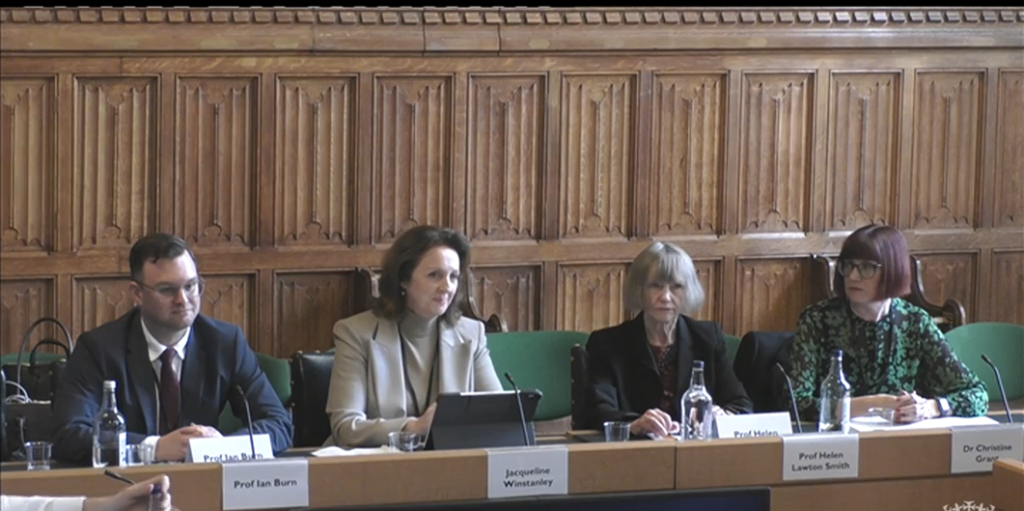Helen Lawton Smith, Professor of Entrepreneurship and Director of the Centre for Innovation Management Research (CIMR), Birkbeck, University of London, h.lawton-smith@bbk.ac.uk & Jacqueline Winstanley, Universal Inclusion, universal.inclusion@icloud.com, and Visiting Fellow & Entrepreneur in Residence CIMR
Following a submission to a call for evidence by the Department of Work and Pensions (DWP) Work and Pensions Committee on Disability and Self-employment, Jacqueline Winstanley and Helen Lawton Smith were invited to give evidence to a DWP Select committee at the House of Commons on May 1 2024. The proceedings were televise on Parliament TV (Parliamentlive.tv – Commons). Parliamentlive.tv – Work and Pensions Committee

Jacqueline and Helen drew on their recent joint Innovation Caucus/Innovate UK research, The Road to Wonder, on previous research and on Jacqueline’s own personal and professional experiences as a disabled entrepreneur and as a leading advocate for better and more inclusive policy-making.
These were the questions we were asked and the answers we gave.
Many disabled people choose self-employment over other forms of employment. Why?

Our study shows this is a rising trend and there are multiple factors influencing this, some participants cite it as a necessity as they want to work, moving away from the narrative of being perceived as tax, welfare or health burdens having no desire to have a life on welfare. Others felt they would have always been entrepreneurs, wanted to be their own boss and are moving to create innovations that are helpful to society.
One of the push factors is that being unable to get into or remain in work, as the employed arena is not changing quickly enough. The issue of a lack of sensitivity by employers to the need for ‘reasonable adjustment’ to working conditions was for many entrepreneurs a factor in leaving work to become an entrepreneur.
The Government says that many self-employed disabled people are self-employed because they do not see other forms of employment as a viable option. Is the high number of disabled entrepreneurs a sign that the Government and employers are failing disabled people?
Our study reinforces the view that employers are not providing an environment where disabled people feel welcomed, valued and are able to navigate the day-to-day complexities in ways which are not detrimental to their health and wellbeing quickly enough. Participants were also mindful of the disability pay gap.
In terms of government, which has tended to concentrate on the employed arena to reduce the disability employment and pay gap, it has failed to recognise the untapped potential of effectively resourcing this sector in this regard and the positive impact on health and wellbeing which we reported in our study.
What are the advantages to society more widely of supporting disabled entrepreneurs?
Our study shows a ripple effect whereby when disabled people are effectively resourced, they not only contribute to their personal socio-economic growth, but also contribute to increasing inclusive economic growth increasing the GDP. This is because the enterprise and innovation they create continues to multiply pointing to huge untapped potential in the sector by way of innovation and health and wellbeing.
We thanked the Select Committee for giving us the opportunity to highlight the creativity of disabled entrepreneurs and explain why innovations are not just for other disabled people. Disabled people’s problem solving extends to products and services for wider society. Supporting disabled entrepreneurs also leads to other jobs in the economy.
How easy is it for disabled people to start their own business?

Our study highlighted both how challenging this can be and the key barriers faced by disabled people in this regard:
- Access to finance, particularly for disabled women;
- Lack of access to practical disability related support;
- Perception and discrimination;
- Lack of access to bespoke business support which includes a health and well-being strand;
- Exclusion from innovation programmes and activities such as being involved in product design for products and services for general and specific disability-related purposes;
- Exclusion from dialogues around policy design and practice;
- Welfare restrictions; and
- The conflict between administration and intent to Access to Work.
Each of these impacts on the others and are also influenced by intersectionality and regional variation.
What is the Government doing to support disabled entrepreneurs, and what isn’t it doing that it should be doing?
Government initiatives such as the Access to Work Award and Innovate UK are important. Directly through the All Party Parliamentary Group for Inclusive Entrepreneurship (APPGIE) the government has responded positively to our recommendations particularly during COVID. The government is in a unique to position to really change the narrative on how disabled people are perceived in terms of creating enterprise and innovation.
- Appoint a neutral government body to undertake ethical collaboration with disabled people and other key players in the design of policies and programmes in this space to address the barriers identified in the report building on best practice and evaluation in the UK and internationally.
- A move to disaggregated data collection across departments will be required to predict and achieve inclusive and sustainable resourcing of this sector and reflects the positive socio-economic benefits of doing so.
- Place initiatives and programmes intended to upscale this sector such as the UK’s Access to Work award within relevant govt departments which foster innovation. This is necessary and enterprise such as positioning within the Department for Business & Trade (DBT) or Department for Science, Innovation & Technology (DSIT) may reframe perception, increase uptake and avoid unintended consequences.
- Ensure that the crucial role that regional factors play is reflected in national/global innovation ecosystems.
- A cultural shift in appreciation and understanding within traditional innovation initiatives such as the UK’s Innovate UK is required to build visibility and awareness of the economic and societal value of innovation and enterprise created by disabled people.
- Build on the positive impact on mental health and wellbeing of disabled people who create innovation and enterprise identified in the report. It is imperative that government departments collaborate seamlessly recognising the synergies that exist in reducing health inequalities within this sector.
References
Lawton Smith, H. and Mansour, D. (2022) Addressing regional inequalities in innovation opportunities for ethnically diverse and disabled entrepreneurs. Project Report. CIMR, Birkbeck, University of London, London, UK. (Unpublished)
Lawton Smith, H., Winstanley, J., et al. 2023 The Road to Wonder. A study exploring the barriers and opportunities to creating innovation and enterprise by disabled people: a summary. Oxford, UK: Innovation Caucus.
Vorley, T., Lawton Smith, H., Coogan, T., Owalla, B. and Wing, K. (2019). Supporting diversity and inclusion in innovation. https://assets.publishing.service.gov.uk/government/uploads/system/uploads/attachment_data/file/902986/InnovateUK_Supporting_Diversity_and_Inclusion_in_innovation_WEBVERSION.pdf
Alternative source:
Vorley, T, Lawton Smith H Coogan, T, Owalla, B and Wing, K (2020) Supporting Diversity and Inclusion, Policy Brief, Innovate UK Supporting Diversity and Inclusion in Innovation report – GOV.UK (www.gov.uk)
HLS & JW May 2nd 2024

